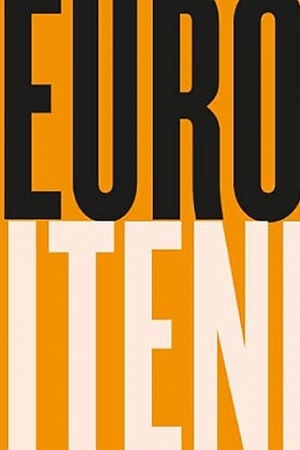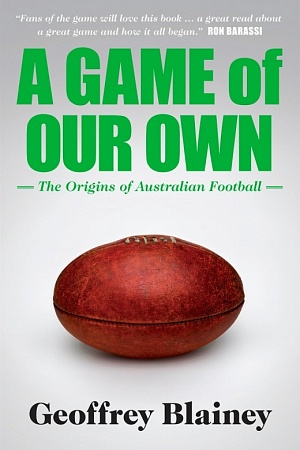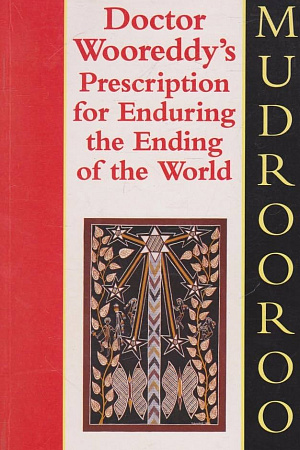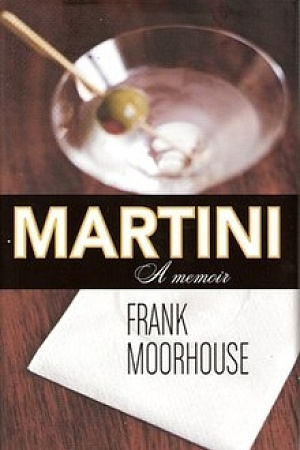Weather
Vintage, $19.95 pb, 260 pp
At the Megasupermarket
Leonardo Da Vinci, Elvis Presley, the Tarot, unsettled weather, love, ducks and a megasupermarket: they’re not subjects that one would often be moved to mention in the same breath, but it is on just this unlikely affiliation that Julie Capaldo’s cunningly plotted second novel is based.
The seed of the novel, planted over five years ago, was something quite different again. A blue glass vase that sat on Capaldo’s kitchen window sill and changed colour with the light gave the author an idea. The blue glass vase features significantly in the book, but one suspects that the novel’s other elements (I can do it too) may well have first accumulated in the form of outrageous puns and wild associations: Elvis as the ‘raining’ King of Rock ‘n’ Roll, for example. And did the presence of Elvis suggest the Tarot – first written, according to one theory, on golden leaves in a temple near Memphis (the ancient capital of Egypt rather than its modern counterpart in Tennessee) – or vice versa?
Pun, however, always balances on the brink of metaphor, and whatever its conception the novel is an overtly allegorical account of the battle between good, in the form of old, loving and affirming wisdom, and evil as go-getting, middle-aged, hyper-materialism. The tone is refreshingly upbeat and the writing flexible and fluent, playing confidently, joyfully, with language and allusion; the author never falls into the trap of taking herself or her New Age extravaganza too seriously.
This is not to say that Capaldo does not have a serious point to make: indeed, she makes it perhaps a tad too often. The message of the blue glass vase is to do with relationships: relationships, Elvis sums up, are our weather.
Someone comes along, stands next to us, illuminates us, so we can then see ourselves and let our true colours show. Or we can stand next to someone who, rather than illuminating us, is like a huge storm cloud that blocks the light. Turns our day to night. But both, whether they enlighten us or cast shadows, come upon us out of the blue …
(I did warn you about the puns.) Lighten up, the characters admonish one another, and they mean it in a more literal sense than the colloquial ‘relax’: lightness, suggests Capaldo, is the only way to clarity, luminosity the only way to the other side. ‘Don’t settle for just “okay”,’ Ruby Seabourne tells her son. ‘Shine.’ Light as a metaphor for love and as a model for our relationship with God are both touched upon – lightly, and it is the lightness and confidence of the author’s touch that makes it all work.
The reader is initially taken in hand by a bronzed and occasionally quacking narrator. His italicised commentary explains the basic attributes of the Tarot and helps to align particular cards with the novel’s characters – and with Leonardo da Vinci, an enigmatic but not unwelcome presence whose role doesn’t become clear until the end of the book (and who even then is likely to cause the reader the most camel-swallowing difficulty). Tarot cards – like the blue glass vase, like the characters in the novel, like us – change their nature according to the company they keep: the Eight of Pentacles on his own is a quiet, dogged chap; put him next to the Hanged Man, however, and he instantly becomes a bit of a wolf.
At the centre of the story is the World MegaSupermarket, ‘the largest one-stop shop in the Southern Hemisphere’ and the consumerist wish-fulfilment of multimillionaire property developer Kenneth Horcheque (names tend to mean what they say in this novel: what price Ruby Seabourne, the wise and virtuous woman in Ken’s opposite corner?) Ruby’s son Cosmos, desperately seeking the comfort of conservative conformity, has fallen under the shadow of his boss Horcheque and changed his name to Colin and his nature for the worse. Anna the check-out chick is mourning Gilbert who has vanished, and resisting Harmony, whose enthusiasm for every new New Age fad is exhausting but surprisingly fruitful. Myles is worshipping Anna from afar; stalwart Bob Browne is doing much the same to Ruby at close hand. And Horcheque’s wife, Estelle, has been shaken into a silence relieved by a mere ten words, a repertoire that, in Capaldo’s capable hands, lends itself to an amazing amount of communication.
With these raw materials, plus the enriching figurative underlay of the Tarot, the expository interpolations of the narrator, and the elemental interference of the energetic Spirit of Rock ‘n’ Roll, Capaldo weaves a suspenseful, satisfying and most engaging fantasy. In literary terms Weather is not deep (pace, back-cover publicist), but it is certainly deeper, as well as better focused and more intricately plotted, than Capaldo’s first novel, Love Takes You Home (1995), while sharing that runaway success’s warmth, optimism and grace of execution. It strikes me as the sort of novel the self-help gurus would love to have written – and perhaps could, if they would just lighten up a little.










Leave a comment
If you are an ABR subscriber, you will need to sign in to post a comment.
If you have forgotten your sign in details, or if you receive an error message when trying to submit your comment, please email your comment (and the name of the article to which it relates) to ABR Comments. We will review your comment and, subject to approval, we will post it under your name.
Please note that all comments must be approved by ABR and comply with our Terms & Conditions.